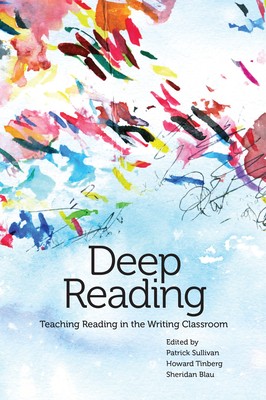
- We will send in 10–14 business days.
- Publisher: National Council of Teachers of English (Ncte)
- ISBN-10: 0814110630
- ISBN-13: 9780814110638
- Format: 15 x 22.6 x 2.3 cm, softcover
- Language: English
- SAVE -10% with code: EXTRA
Deep Reading (e-book) (used book) | bookbook.eu
Reviews
Description
Arguing that college-level reading must be theorized as foundationally linked to any understanding of college-level writing, editors Patrick Sullivan, Howard Tinberg, and Sheridan Blau continue the conversation begun in What Is "College-Level" Writing? (2006) and What Is "College-Level" Writing? Volume 2: Assignments, Readings, and Student Writing Samples (2010). Measurements of reading abilities show a decline nationwide among most cohorts of students, so the need for writing teachers to thoughtfully address the subject of reading, especially in grades 6-14, has become increasingly urgent. Curriculum and state standards often reflect an impoverished and reductive understanding of reading that views readers as passive recipients of information, fueling the widespread use of standardized tests to measure proficiency in English literacy, and ignoring decades of reading scholarship that positions readers in more complex relationships with the texts they read. Contributors to this collection--high school teachers, college students who discuss the challenges they faced as readers and writers, and composition scholars--offer an antidote to this situation. These authors (1) define the challenges to integrating reading into the writing classroom, (2) develop a theory of reading as a specific type of inquiry and meaning-making activity, and (3) offer practical approaches to teaching deep reading in writing courses that can be put immediately to use in the classroom. The volume concludes with letters written directly to students about the importance of reading, not only in the classroom but also as a richly complex social, cognitive, and affective human activity.
EXTRA 10 % discount with code: EXTRA
The promotion ends in 20d.22:01:18
The discount code is valid when purchasing from 10 €. Discounts do not stack.
- Publisher: National Council of Teachers of English (Ncte)
- ISBN-10: 0814110630
- ISBN-13: 9780814110638
- Format: 15 x 22.6 x 2.3 cm, softcover
- Language: English English
Arguing that college-level reading must be theorized as foundationally linked to any understanding of college-level writing, editors Patrick Sullivan, Howard Tinberg, and Sheridan Blau continue the conversation begun in What Is "College-Level" Writing? (2006) and What Is "College-Level" Writing? Volume 2: Assignments, Readings, and Student Writing Samples (2010). Measurements of reading abilities show a decline nationwide among most cohorts of students, so the need for writing teachers to thoughtfully address the subject of reading, especially in grades 6-14, has become increasingly urgent. Curriculum and state standards often reflect an impoverished and reductive understanding of reading that views readers as passive recipients of information, fueling the widespread use of standardized tests to measure proficiency in English literacy, and ignoring decades of reading scholarship that positions readers in more complex relationships with the texts they read. Contributors to this collection--high school teachers, college students who discuss the challenges they faced as readers and writers, and composition scholars--offer an antidote to this situation. These authors (1) define the challenges to integrating reading into the writing classroom, (2) develop a theory of reading as a specific type of inquiry and meaning-making activity, and (3) offer practical approaches to teaching deep reading in writing courses that can be put immediately to use in the classroom. The volume concludes with letters written directly to students about the importance of reading, not only in the classroom but also as a richly complex social, cognitive, and affective human activity.


Reviews